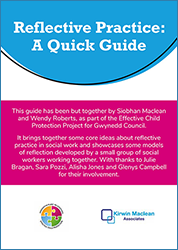When pausing to think about the word reflection, we may conjure the mental image of a mirror. A reflection in a mirror is an exact replica of what is in front of it. In contrast, Biggs (1999) describes reflective practice in professional practice not as an exact replica but showing what it might be, an improvement on the original.
Reflective practice can be promoted with the help of others in formal and informal settings. For example, in supervision, in individual sessions and group settings. Practice mentoring promotes the development of reflective practice.
Moral injury is described as the psychological distress or trauma that results from actions that violates someone’s moral or ethical code. Moral injury has been discussed in the context of COVID 19 and some of the actions taken by practitioners. It is argued that because of the nature of social work; moral injury was experienced long before the pandemic. Greenberg et al (2020) identified 6 things that can mitigate the negative impact of moral injury on individuals and organisations. Three of these directly relate to reflective practice.
These are:
- A reflective culture within the organisation
- Reflective, emotionally supportive conversations, particularly in supervision
- The opportunity for in depth reflection with a particular focus on feelings.
As part of Effective Child Protection, a Quick Guide to Reflective Practice was developed by practitioners with the assistance of Siobhan Maclean and Wendy Roberts. You can download an electronic version of the guide.
